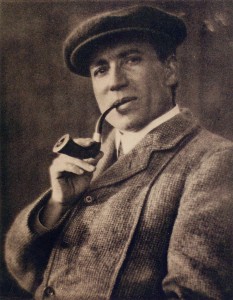A few weeks ago we were puzzling over a fragment discovered in the archive of Jot HQ. This was a draft in pencil of one page of a letter written in reply to literary journalist Ivor Brown around 1943. The hand was very hard to read at times, but persistence paid off and eventually I produced a decent stab at the letter. From its contents I deduced that the writer was probably an elderly lawyer from the Cotswold region of the UK who had been friendly with tramp poet W. H. Davies, enjoyed the poems of John Betjeman, Clare and Blunden and had published a slim volume of verse himself, as had his son, a former army officer.
Further research revealed that this apparently obscure amateur poet was the rather famous ‘ friend to the poets ‘ John Wilton Haines, from Hucclecote, near Gloucester, who over nearly five decades befriended , not only Davies, but a number of twentieth century literary figures, including Edmund Blunden, John Masefield, W. H. Hudson, J. C. Squire, Seigfried Sassoon, Eleanor Farjeon, J. Gould Fletcher, Sir Edward Marsh, Walter de la Mare, C. Day Lewis, Lascelles Ambercrombie, Gordon Bottomley, Ivor Gurney, Robert Frost, Wilfred Gibson, James Elroy Flecker and Edward Thomas. He also communicated with some eminent musicians and composers, notably Ralph Vaughan Williams, Gerald Finzi and Herbert Howells.
Born in 1875 to a lady from India and a Gloucester solicitor whose family had practised law for generations, Haines trained as a solicitor after leaving school and then joined the family firm. Always passionate about classical and modern literature, and a dedicated book collector, Haines made it his business to seek out local authors and poets, notably those ‘ Georgian ‘ poets who had settled in and around Dymock, on the edge of the Forest of Dean. He made friends with them and offered them financial help and legal advice. In return many sent him their latest work for his opinion. In 1921 Haines himself had a collection of his own poetry privately printed. On his death in 1960, Haines’ son Robin ( b 1913), whose own slim volume, Somewhere, Somehowhad come out in 1942, inherited his father’s literary archive, which eventually passed to his widow. It was she who donated the papers to the Gloucestershire Archives, where they can be examined today. [RMH]

